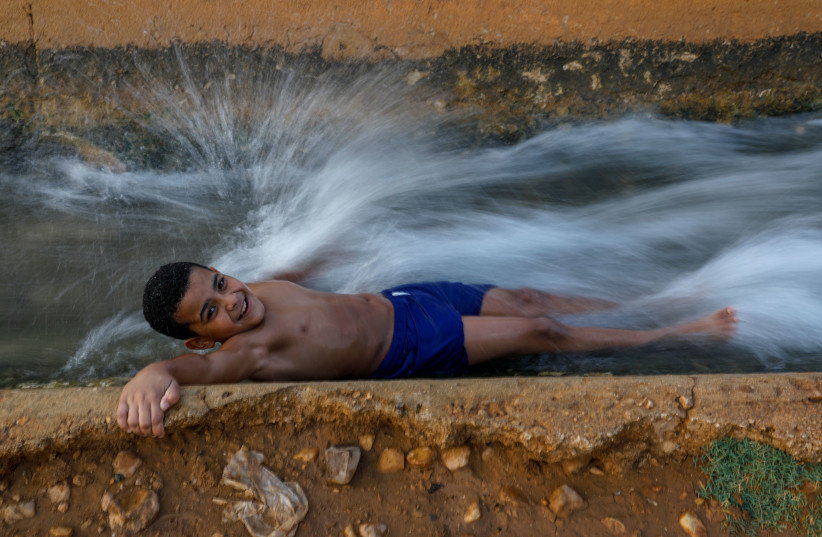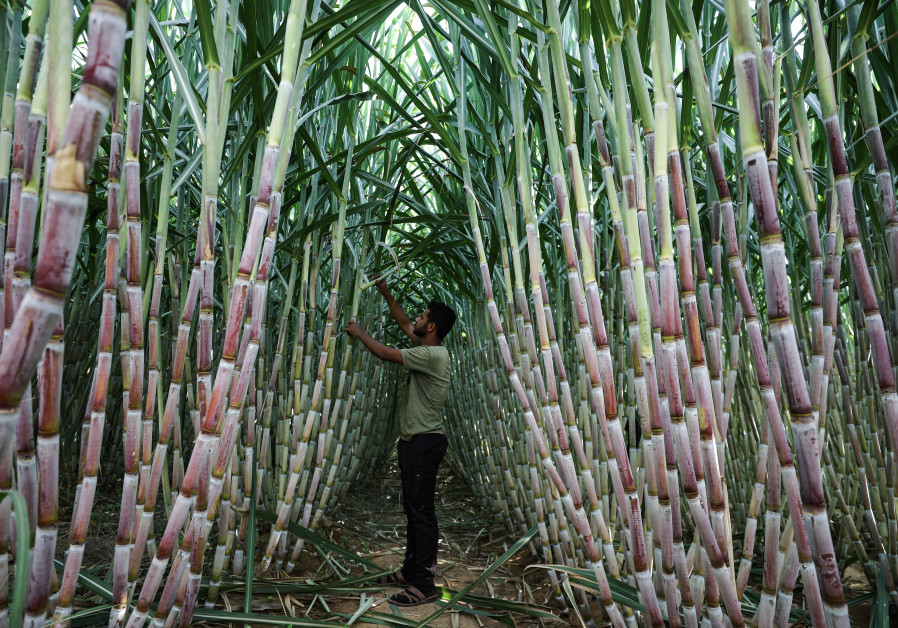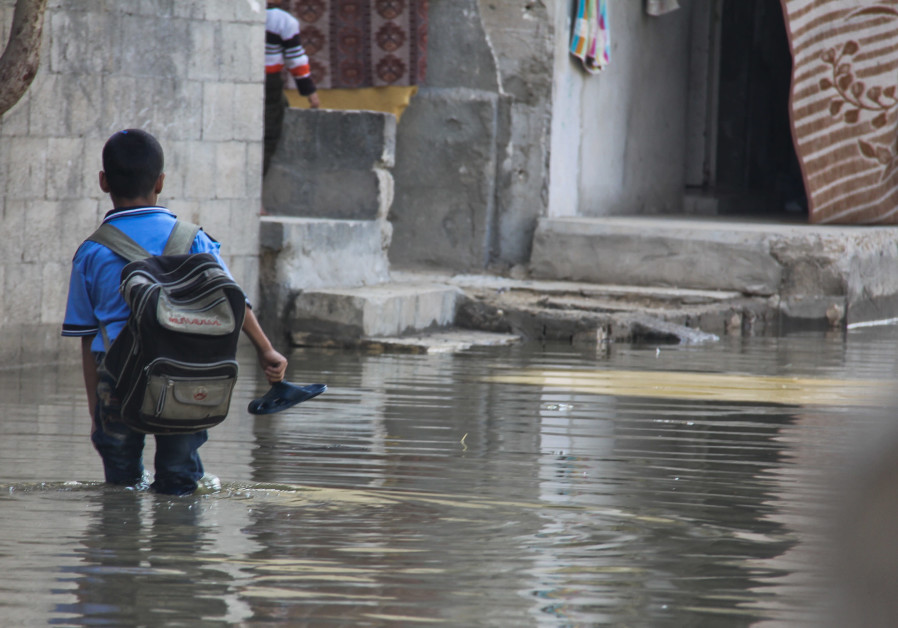Palestinians depend heavily on rain and underground water sources, which Israel controls.
By MOHAMMAD AL-KASSIM/THE MEDIA LINE NOVEMBER 21, 2020 16:39

As the world gets hotter, the Middle East’s arid regions are becoming drier, water is disappearing and the prospect for conflict is growing, Palestinians say.Former Palestinian Authority Water Minister Shaddad Attili told The Media Line that Jordan, Israel and the Palestinians are competing for water.
We are sharing almost all of our resources with Israel,” he says adding that this is causing a massive shortage. Rapid population growth in the territories has increased the demand for water in a region where water is often a source of conflict.
Palestinian officials say that in order to solve the problem, they must have control of water resources. Palestinians have long complained that they do not get their fair share.

Attili, who heads the Palestinian delegation on water negotiations with Israel, says Palestinians depend heavily on rain and underground water sources, which Israel controls.
“What we are getting from there is less than 15% of the total yield of the aquifers, leaving more than 85% controlled by Israel,” he complains. For exploitation of an aquifer to be sustainable, the water must be replenished at least as quickly as it is removed.
Israel has solved its water shortage by building desalination and water-treatment plants. The Palestinians started working on several water-treatment projects in the West Bank, but Attili says they had to stop because they ran out of money.”
We lost, unfortunately, the USAID [US Agency for International Development]. The USAID was among the biggest donors in the water sector. But since [US President Donald] Trump’s arrival, [there have been]… sanctions put on the occupied people by Trump’s administration. So they instructed USAID to leave.”
Hossam Badarneh runs a date farm in the Jordan Valley.
He says water is scarce in the area, and many wells are starting to go dry.He adds that he is lucky to have a well on his farm but needs help from international organizations to maintain it, noting that Palestinian farmers are not allowed to drill or dig for water without a permit from the Israeli military – and obtaining one is a long and arduous process.
“We have a well that produces 70 cubic meters [nearly 2,500 cubic feet] of water an hour and brings up surface water. Because the Israelis do not allow us to dig deep[er], this leads to a high level of salinity,” he notes.
“Our well has a salinity of 3,000 parts per million. We face great difficulties from the Israeli occupation in allowing the maintenance of the well and its expansion, so we have to involve the FAO,” he said, referring to the Food and Agriculture Organization of the United Nations.
Under the Oslo Accords, Palestinians in the West Bank and Gaza Strip buy most of their water from Israel. Attili says this water is expensive, and he wonders why Palestinians should pay for their own water.

“The Israelis get 300 liters per capita per day and the settlers… are taking our water from beneath our feet,” he states. “[With] per capita domestic consumption, it varies from 600 up to 1000.”
Abdel Rahman Tamimi, director general of the Palestinian Hydrology Group, says the Palestinians are in a precarious situation and may not always be able to get water.
“Sixty percent of the Palestinians… are insecure in terms of water availability,” he says.Tamimi told The Media Line that the water crisis is killing Palestinian agriculture.
“That’s why Palestinian irrigated areas shrank from 27% of the total agricultural area in the West Bank to 3.4%,” he notes.
The outlook for Palestinian agriculture and food security or accessibility is gloomy, he believes. “In the next 10 years, in my opinion, there will be no irrigated areas because water will not be available,” he states.
A Future without Agriculture?
With so little water for agriculture, Palestinians may stop farming.Farmer Mohammed Lulu tells The Media Line he may have no choice but to leave the land that has fed him and others.
Lulu’s farm is tucked between the West Bank hills near the town of Bir Zeit. He and his cousin Yousuf inherited their farms from their fathers, and both grow arugula, green onions, radishes, spinach, tomatoes, cucumber and cabbage.Mohammed says the lack of a steady supply of water is forcing farmers to cultivate less land.
“If water is not available, we may just stop and go home. Water is life, and if water is not available, there will be no life,” he says.
His cousin Yousef tells The Media Line that he hauls water from nearby villages, which adds to the cost. “We have not cultivated all the land due to the scarcity of water,” he relates. “If we had available water, we would cultivate all the land and we would not leave a single inch empty. There isn’t enough water to farm all of the land.”
The water shortage has also prompted the 250 Bedouin living in Jaba’a, north of Jerusalem, to abandon their traditional way of life.
The mukhtar, or head man, Muhammad Salem Musa Ka’abneh, tells The Media Line: “We stopped herding our livestock because there’s no water.”Staying on the land without a dependable water source is becoming impossible, the mukhtar says.”
The water problem,” he says, “has made most of the people in the community think of leaving for another area where water is available.”
Gidon Bromberg is the Israeli director of EcoPeace Middle East, which brings together Israelis, Palestinians and Jordanians to promote sustainable development and advance peace. He says the complexity of peace talks is affecting water issues.
“The conflict between Israelis and Palestinians is still… focused on water issues,” he explains. “As EcoPeace would say, water issues are being held hostage to other, perhaps more difficult, political issues that need to be resolved.”
Bromberg maintains that the political leadership on both sides should put the need for water ahead of their political agendas. “It’s time for the political leadership on both sides to wake up,” he states.“
One of the reasons there’s no movement on the water issue is because both the government of Israel and the Palestinian Authority are sticking to [a] negotiation paradigm that either the governments agree on all the final-status issues – Jerusalem, settlements, borders, including water – or they don’t agree on anything,” he says.“
In this way, water issues, which today are solvable, are being held hostage, not because there isn’t water available to fairly share… [but] because of the political paradigm of achieving everything or achieving nothing.”
Bromberg says there is no good reason the water crisis cannot be resolved. “If water today is the low-hanging fruit, it’s almost a crime for both of our peoples not to solve the water issue,” he feels. “We could see more water in every Palestinian home if we were to move forward on this issue.”
Blue Babies
In the Gaza Strip, drinking water is scarce and costly. It is also polluted.
Attili says that 97% of the fresh water in the impoverished coastal enclave is unfit for human consumption.
“The first issue to mention is the situation in Gaza. Water isn’t fit for human consumption. Some reports say 60% of diseases are water-related,” he says.Millions of liters of raw sewage dumped into the Mediterranean off Gaza are creating an enormous health crisis, leading the United Nations to predict that the small, overcrowded area will soon be uninhabitable, he relates.
“Our women are delivering blue babies because of the high concentration of nitrate. We are having kidney problems,” he notes.
Attili blames what he calls the Israeli blockade on the Gaza Strip ever since the Islamist Hamas movement took control 12 years ago.
From the north and east of Gaza, Israel controls the entry of items, including fuel and gas, to ensure that no dual-use items or weapons are smuggled in, while Egypt controls Gaza’s southern entrance.
Tamimi says the Palestinians are “headed for disaster. We are headed to be a customer… [of] Israeli desalination plants. In my opinion, the irrigated agriculture in Palestine will be reduced to a minimum in the future.”
The lack of a political resolution on the horizon has hindered efforts to address the water crisis, which is creating tension and may cause things boil over, he said.
“This will lead to more violence between Palestinians and Israelis because, the thing is, the Palestinians will not keep silent when they see their land dry and… Israeli flowers [across the border] growing.”
Read more at themedialine.org
